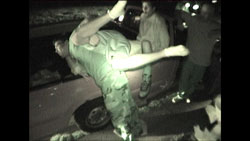Description
In Junior War, a throng of high schoolers congregates at night for a party in the woods sometime in the year 2000. A band plays, the kids get drunk, the boys and girls tepidly flirt, and groups deploy into cars for the purpose of destroying mailboxes, tee-peeing houses, breaking lawn ornaments, and sparring with the police. The film is composed entirely of footage Trecartin took during his senior year of high school in exurban Ohio; as such, it baits the viewer with genealogical significance. The film is incontrovertibly source material dangling the possibility that we've finally unearthed Sarah Source--but it's also rigorously repurposed, just as any social media #tbt marks the present more reliably than it renders the past.
In the context of the tetralogy, Junior War looks like a time capsule from "the human era," otherwise known as high school, where themes and phrases from the other three films--searching for keys, smashing, farting--uncannily recur. All of Trecartin's trademarks are here--frenetic pacing, musical punctuation, carnivalesque destruction, adolescent dialect--but this time the Ryanverse is forged out of actual co-eds. "We found a golf ball, a tennis ball, and a baseball," a boy proudly declares, underlining the male brain's infinite capacity for pointless taxonomy. Other teens display aptitude for legalism, complaining about a policeman who was "wrongfully accusing" and "didn't have probable cause to fucking pull us over." Another boy at odds with law enforcement combatively declares, "I've been riding these woods since I was three years old. I know all these woods! If anything I'm going that way," yielding a stream of teen poetry whose peculiarity might go unnoticed but for its resonance with the rest of Priority Innfield's unruly syntax.
Are these the formative experiences that gave rise, a decade later, to the artist Ryan Trecartin? To the extent that Priority Infield is an exercise in retroflection--in revisiting the past and also reshaping it--Junior War looks more like the diary of a time-traveler who has re-entered a historical moment and turbulently restructured it.
All remembering is editing--an attempt to create what scholars call a ?usable past.? In Junior War, the editing is intentional and aggressive--but is the past it creates usable? Most of the footage is recorded in night vision, a style that recalls both The Blair Witch Project, which came out in 1999, a year before the footage was taken, and Zero Dark Thirty, which came out in 2012, a year before the footage was released. The youth in Junior War are expressly militarized, but they're also innocents who venture into the woods in search of the supernatural.
The arrow of time--whichever direction it points--is fraught with guilt. To age is to decline: this we're told. To trace is to blame: this we fear. To the extent that Priority Innfield confounds our understanding of sequencing, iteration, and cause and effect, it also lets us off the hook for crimes of chronology. By the end we may feel confused, exhausted, and epistemologically spent, but we also feel exonerated. "Nothing is documented." We all believe that, don't we?
-- Chris Glazek
Exhibition & Distribution Conditions
Please contact the office for further information regarding rentals, acquisitions, and exhibition loans.
